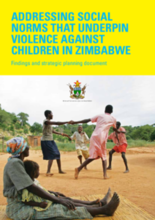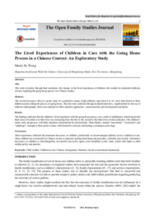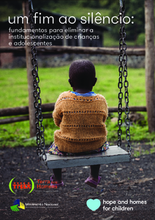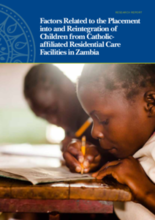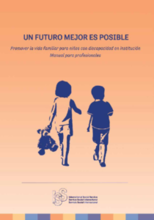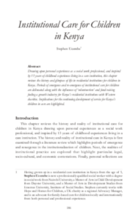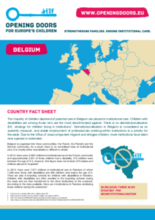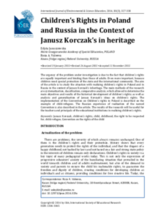Displaying 1001 - 1010 of 1482
This report highlights key findings from a social norms study conducted in Zimbabwe to understand the drivers of violence affecting children.
This study revealed, through their narrations, the changes in the lived experiences of children who resided in residential childcare services regarding the going home process in a Chinese context.
Décadas de pesquisas comprovam que o crescimento em instituições de acolhida gera consequências psicológicas, emocionais e físicas, incluindo transtornos de apego, atrasos cognitivos e no desenvolvimento, e uma falta de habilidades sociais e de competências para a vida, trazendo diversas desvantagens na idade adulta.
This is a study from Catholic Relief Services that investigates the factors related to children’s placement in Catholic-affiliated residential care facilities in Zambia. According to this study, the government estimates that there are approximately 190 residential-care facilities located in Zambia, and of those 40 are Catholic-affiliated. At the time of this study, there were 1674 residents living in residential care.
Este manual proporciona orientación a los profesionales que trabajan con niños con discapacidades en el cuidado residencial.
This paper aims to understand the functioning of institution in protecting the rights of children who are in need of care and protection and highlight measures for revamping the institutional care and revolutionizing family care.
The article aims to show the process of deinstitutionalisation in Bulgaria.
In this chapter of Global Perspectives, Stephen Ucembe uses his personal experiences and his experiences as a social work professional to discuss institutional care in Kenya. This chapter covers the factors that influence institutional care of children in Kenya, international aid, volunteerism, and the negatives of institutional care.
This Country Fact Sheet from Belgium contains short facts on care and institutionalization in Belgium.
The aim of this article is to study the situation on realizing children’s rights in Poland and in Russia in the context of Janusz Korczak’s principles.

